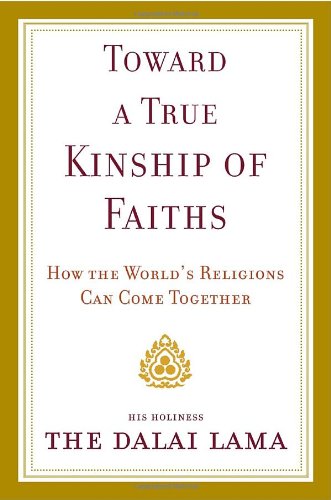Book review: Toward a True Kinship of Faiths
by the Dalai Lama
★★★★★
The most special thing about this book is the way it leaves you with the feeling that you’ve been talking face to face with His Holiness, the Dalai Lama. He writes with humility and passion, on matters close to his heart.
This book is about learning to get along, because the world is shrinking. Advances in science and industry have brought us closer together, even as religious differences seem extreme. Yet, the fascinating thing is, all of the world’s most respected religions seem to share one thing in common: A teaching of compassion. Even while some religions are theistic and others, like the Buddhist tradition of the Dalai Lama, are non-theistic, the basic teaching is the same. Compassion is, in different variations, the common denominator.
As such, the Dalai Lama shows familiarity and respect for all the popular religions, and maintains that pluralism is the healthiest answer. He pleads for inter-denominational understanding, and he writes with the authority and intelligence that would be expected of his title. I couldn’t help but be both impressed and inspired. Yet, when it comes to discussing alternative religions, I doubt he will ever be able to relate on the same level to those born into those religions. The Dalai Lama can appear logical and naive in the same breath, as he dreams about mutual respect across religious boundaries. Consider this problem formula, which arises in any religion where adherents are taught that theirs is the “only true way:”
I feel the Spirit ==> God is with me and my chosen religion ==> I have found the one true way
Yet, though the Dalai Lama is optimistic for the future (as am I), he understands the problem. Religions tend toward exclusivism, so while adherents are taught concern for others, this concern often translates merely into an urge for evangelism. Christians want everybody to enjoy being a Christian! On this topic, the Dalai Lama strongly disagrees. When speaking outside his country, he often begins by assuring his audience that he is not promoting Buddhism; rather, he maintains that the best religion for any person is usually the religion of their heritage. Respect for one another’s beliefs is the only way to overcome religious squabbles and promote peace.
Which, of course, is another place where the book appears a bit naïve. Fundamentalist Christians don’t want peace; they get positively giddy at the thought of a world war, since this means Jesus is coming to rescue them.
So what’s the answer? I’m not convinced this book has any, because I’m not convinced there are any quick fixes. But I agree that believers must, one at a time and at a grass-roots level, come to see the world in a different manner. We must see across religious boundaries and welcome every human as a brother or sister, like Jesus taught.
Well, we can dream.












 354 Circles
354 Circles
 603 Goodreads Friends & Fans
603 Goodreads Friends & Fans

 Hello! I'm an author, historical Jesus scholar, book reviewer, and liberal Christian, which means I appreciate and attempt to exercise the humanitarian teachings of Jesus without getting hung up on any particular supernatural or religious beliefs.
The Bible is a magnificent book that has inspired and spiritually fed generations for thousands of years, and each new century seems to bring a deeper understanding of life’s purpose. This is true of not only Christianity; through the years, our age-old religions are slowly transforming from superstitious rituals into humanitarian philosophies. In short, we are growing up, and I am thrilled to be riding the wave.
I avidly read all thought-provoking religion titles. New authors: I'd love to read and review your book!
Hello! I'm an author, historical Jesus scholar, book reviewer, and liberal Christian, which means I appreciate and attempt to exercise the humanitarian teachings of Jesus without getting hung up on any particular supernatural or religious beliefs.
The Bible is a magnificent book that has inspired and spiritually fed generations for thousands of years, and each new century seems to bring a deeper understanding of life’s purpose. This is true of not only Christianity; through the years, our age-old religions are slowly transforming from superstitious rituals into humanitarian philosophies. In short, we are growing up, and I am thrilled to be riding the wave.
I avidly read all thought-provoking religion titles. New authors: I'd love to read and review your book!
 Hi! While Lee writes the articles and reviews the books, I edit, organize, and maintain the blog. The views expressed here are Lee's but I'm his biggest supporter! :-)
Hi! While Lee writes the articles and reviews the books, I edit, organize, and maintain the blog. The views expressed here are Lee's but I'm his biggest supporter! :-)
Connect With Me!